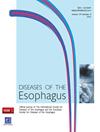新辅助放化疗和单切口微创食管切除术后食管癌的长期肿瘤学结果
IF 2.3
3区 医学
Q3 GASTROENTEROLOGY & HEPATOLOGY
引用次数: 0
摘要
对于局部晚期食管癌症,食管切除术后新辅助放化疗是一种广泛接受的标准治疗方法。然而,食管切除术的首选技术仍有争议。多切口微创食管切除术(MIE)显示出与开放式食管切除术相似的长期肿瘤学结果,但由于其伤口大小减小,它提供了更短的住院时间和更少的手术疼痛。为了尽量减少伤口,我们开发了单切口MIE,包括单孔胸腔镜和单切口腹腔镜。在这项研究中,我们介绍了癌症在新辅助放化疗和单切口MIE后的长期肿瘤结果,并确定了肿瘤结果不佳的危险因素。材料与方法:2008年至2022年,纳入我所573例局部晚期食管癌症患者行新辅助放化疗后MIE治疗。其中254例行单切口MIE。Kaplan-Meier分析用于计算总生存期(OS)和无进展生存期(PFS)。Cox比例风险回归模型采用单变量和多变量分析。采用新辅助放化疗和单切口MIE治疗癌症的5年OS分别为62.5%(0–1期)、34.5%(2期)、31.1%(3期)和13.1%(4期),而5年PFS分别为47.7%(0-1期),33.2%(2阶段)、26.5%(3阶段)和19.6%(4阶段)(图1)。对于接受新辅助放化疗和MIE治疗的癌症,年龄等因素 ≤ 65,女性,FEV1 > 80%,单切口MIE,手术时间 ≤ 500分钟,淋巴结恢复>40,病理癌症分期≤2,临床癌症分期≤2和阴性切除率显著预测总生存率(OS)的提高。经多因素分析,只有年龄、FEV1、癌症分期(病理和临床)和切除率是OS的独立危险因素。对于晚期癌症患者,新辅助化疗后单切口MIE是一种可行的手术,具有公平的长期肿瘤结果。风险因素,如年龄 > 65,发烧1 ≤ 80%,病理癌症分期>2,临床癌症分期>2和阳性切除率独立预测OS差。本文章由计算机程序翻译,如有差异,请以英文原文为准。
340. LONG-TERM ONCOLOGIC OUTCOMES OF ESOPHAGEAL CANCER AFTER NEOADJUVANT CHEMORADIATION AND SINGLE-INCISION MINIMALLY INVASIVE ESOPHAGECTOMY
For locally advanced esophageal cancer, neoadjuvant chemoradiation therapy followed by esophagectomy is a widely accepted standard treatment. However, the preferable techniques for esophagectomy are still debatable. Multi-incision minimally invasive esophagectomy (MIE) had shown similar long-term oncologic outcomes with open esophagectomy, while it provided shorter hospital stay and less surgical pain due to its decreased wound size. Following the trend to minimize wounds, we developed single-incision MIE, with uniport thoracoscopy and single-incision laparoscopy. In this study, we presented the long-term oncologic outcomes of esophageal cancer after neoadjuvant chemoradiation and single-incision MIE and identified the risk factors for poor oncological outcomes.
Materials and Methods: From 2008 to 2022, 573 patients with locally advanced esophageal cancer who received neoadjuvant chemoradiation followed by MIE at our institute were included. 254 of them underwent single-incision MIE. Kaplan–Meier analysis was used to calculate overall survival (OS) and progression free survival (PFS). Univariate and multivariate analyses were applied by Cox proportional hazard regression model.
The 5-year OS of esophageal cancer with neoadjuvant chemoradiation and single-incision MIE was 62.5% (stage 0–1), 34.5% (stage 2), 31.1% (stage 3) and 13.1% (stage 4), while its 5-year PFS was 47.7% (stage 0–1), 33.2% (stage 2), 26.5% (stage 3) and 19.6% (stage 4) (Figure 1).
For esophageal cancer treated with neoadjuvant chemoradiation and MIE, factors such as age ≤ 65, female, FEV1 > 80%, Single-incision MIE, operation time ≤ 500 min, lymph nodes retrieved>40, pathological cancer staging ≤2, clinical cancer staging ≤2 and negative resection margin were significantly predictive of improved overall survival (OS). After multivariate analysis, only age, FEV1, cancer staging (both pathological and clinical) and resection margin were independent risk factors for OS.
For patients with advanced esophageal cancer, single-incision MIE after neoadjuvant chemoradiation is a feasible procedure with fair long-term oncological outcomes.
Risk factors, such as age > 65, FEV1 ≤ 80%, pathological cancer staging >2, clinical cancer staging >2 and positive resection margin were independently predictive of poor OS.
求助全文
通过发布文献求助,成功后即可免费获取论文全文。
去求助
来源期刊

Diseases of the Esophagus
医学-胃肠肝病学
CiteScore
5.30
自引率
7.70%
发文量
568
审稿时长
6 months
期刊介绍:
Diseases of the Esophagus covers all aspects of the esophagus - etiology, investigation and diagnosis, and both medical and surgical treatment.
 求助内容:
求助内容: 应助结果提醒方式:
应助结果提醒方式:


